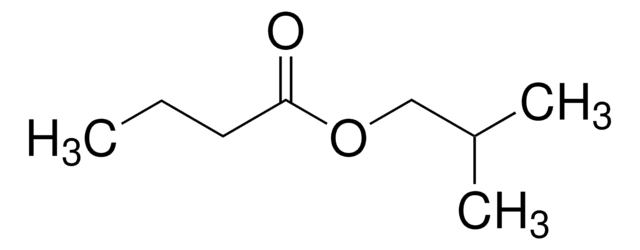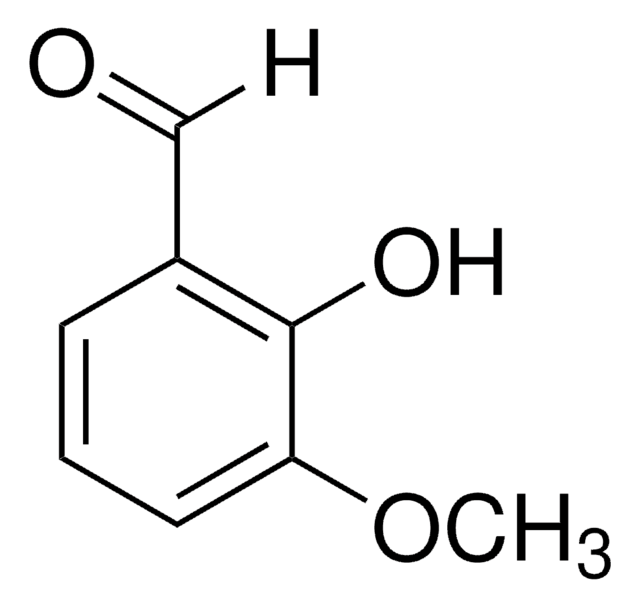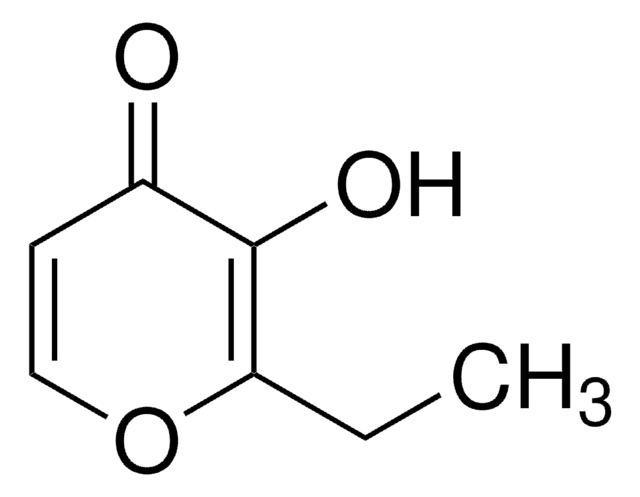W310700
Vanillin
≥97%, FCC, FG
Synonym(s):
4-Hydroxy-3-methoxybenzaldehyde, Vanillic aldehyde
About This Item
Halal
Kosher
Recommended Products
biological source
synthetic
Quality Level
grade
FG
Halal
Kosher
reg. compliance
EU Regulation 1334/2008 & 178/2002
FCC
FDA 21 CFR 182.60
FDA 21 CFR 182.90
vapor density
5.3 (vs air)
vapor pressure
>0.01 mmHg ( 25 °C)
description
Agency/Method; meets purity specifications of JECFA
Assay
≥97%
form
powder or crystals
bp
170 °C/15 mmHg (lit.)
mp
81-83 °C (lit.)
solubility
DMSO: soluble(lit.)
application(s)
flavors and fragrances
Documentation
see Safety & Documentation for available documents
food allergen
no known allergens
Organoleptic
creamy; sweet; vanilla
SMILES string
COc1cc(C=O)ccc1O
InChI
1S/C8H8O3/c1-11-8-4-6(5-9)2-3-7(8)10/h2-5,10H,1H3
InChI key
MWOOGOJBHIARFG-UHFFFAOYSA-N
Looking for similar products? Visit Product Comparison Guide
General description
Application
- Vanillin and 4-hydroxybenzyl alcohol promotes cell proliferation and neuroblast differentiation in the dentate gyrus of mice via the increase of brain-derived neurotrophic factor and tropomyosin-related kinase B.: The study explored how vanillin and 4-hydroxybenzyl alcohol promote cell proliferation and neuroblast differentiation in mice, highlighting their potential neurogenic effects (Cho et al., 2016).
related product
Signal Word
Warning
Hazard Statements
Precautionary Statements
Hazard Classifications
Eye Irrit. 2
Storage Class Code
11 - Combustible Solids
WGK
WGK 1
Flash Point(F)
319.6 - 321.4 °F - closed cup
Flash Point(C)
159.8 - 160.8 °C - closed cup
Personal Protective Equipment
Choose from one of the most recent versions:
Already Own This Product?
Find documentation for the products that you have recently purchased in the Document Library.
Customers Also Viewed
Our team of scientists has experience in all areas of research including Life Science, Material Science, Chemical Synthesis, Chromatography, Analytical and many others.
Contact Technical Service










